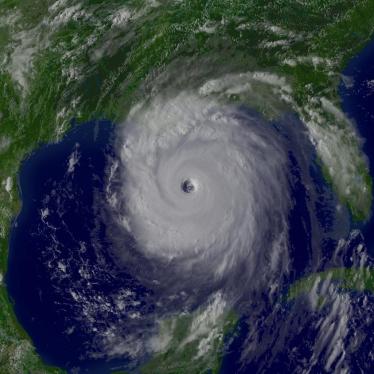Weeks after they should have been set free, hundreds of detainees arrested for minor offenses before Hurricane Katrina hit New Orleans remain behind bars, Human Rights Watch said today. More than a month after the storm, they have still not been brought before a judge.
In the weeks before the hurricane, the detainees were arrested in or around New Orleans for such minor offenses as sleeping in public, begging and public intoxication. They were still awaiting their initial hearing before local judges when the storm hit. Due to the hurricane, the arrestees were evacuated from local jails in and around New Orleans and dispersed to local and state facilities across Louisiana.
Six weeks later, they are still waiting to be brought before a judge. Even if found guilty, they would only have spent 10 days at most in jail. Many would have been released on bond and some would never have been prosecuted. Instead, they remain locked up in jails scattered throughout the state, unable to rejoin their families, many of whom are also struggling to rebuild their lives in the wake of the hurricane.
“People entitled to freedom remain behind bars because public officials are putting up obstacles instead of restoring justice after the hurricane,” said Corinne Carey, a lawyer and researcher for Human Rights Watch. “Keeping people locked up six weeks after the storm for petty offenses they may not have even committed makes a mockery of due process.”
Local parish prisons—the equivalent of a county jail—in six Louisiana parishes hit hardest by the hurricane held more than 8,500 people when the storm hit. These detainees were evacuated to 43 state and local facilities across the state. Several hundred were sent to Florida as well. Some had been convicted of felonies and were under the jurisdiction of the state Department of Public Safety and Corrections. But most were being held for minor municipal offenses or misdemeanors such as public intoxication, disorderly conduct, sleeping in a public place, traffic violations, or even reading tarot cards without a license.
In the first days after Katrina, the continued detention of detainees who should have been released could have been explained by the chaotic circumstances under which they were evacuated and by Katrina’s impact on the criminal justice system. Courts were shut, lawyers dispersed, and records were inaccessible.
But now, more than six weeks have passed. On Tuesday, the State Department of Public Safety and Corrections announced that it had released more than 700 detainees who had completed their sentences for municipal and misdemeanor charges. But hundreds more, many of whom may be innocent, have still not been before a judge and remain in jail.
Local courts that have the authority to release the detainees remain closed. Although criminal defense attorneys, on October 6, asked the Louisiana State Supreme Court to grant jurisdiction to a single judge to hear all cases originating from the six affected parishes, the court has not yet ruled on the request. If denied, lawyers will be forced to file separate actions in the 26 separate judicial districts where the arrestees are now being kept, a monumental task for the lawyers who are working as volunteers—many of whom are New Orleans evacuees themselves.
Prosecutors and department of corrections officials have not simply dragged their feet, however. They have also actively sought to impede the release of those who should be free. In habeas and civil rights proceedings brought on behalf of some 200 prisoners, the state’s attorney general, the district attorney, and the department of corrections all argued that the court should delay releasing those who served their time until they could demonstrate that they had somewhere to go when they were released. There is no requirement under Louisiana law, however, that those released after serving their sentence inform authorities of where they intend to go.
A spokeswoman for the department of corrections told the Times-Picayune last week that the department was concerned about the “wave” of prisoners being released into communities throughout Louisiana with “no place to go.” In habeas proceedings in one municipal court, the corrections department has said it would release people in alphabetical order, 35 or so a day, excluding weekends.
“If the department adopts the same position for detainees entitled to release,” said Carey, “this will mean more than a month of additional unnecessary confinement for those at the end of the list.”
Click here for profiles of individual prisoner evacuees and their families who either should have been released by now, or who were released long after they should have been. The profiles also briefly describe their experiences in jail after Hurricane Katrina hit New Orleans, before they were evacuated. The information below was obtained through interviews with families of over 40 evacuated prisoners and with some prisoners themselves, conducted by Human Rights Watch. All of the names of the prisoners have been changed to protect the confidentiality of the prisoner evacuees and their families. However, they are willing to talk to the press upon request.
To read the testimonies, please see: https://www.hrw.org/english/docs/2005/10/13/usdom11869.htm







